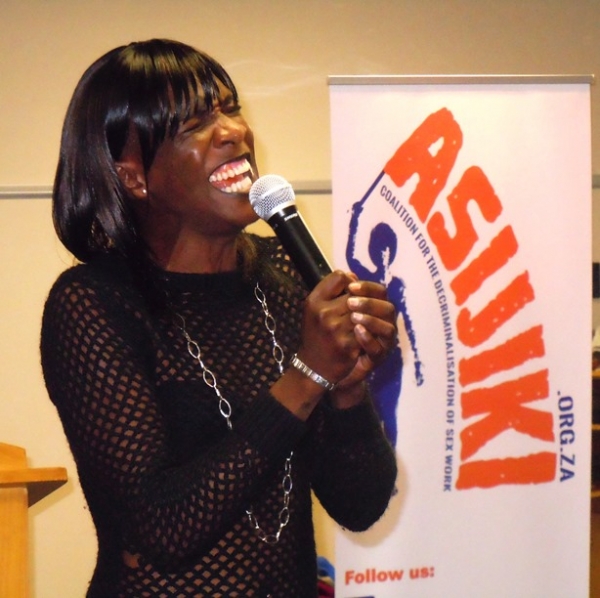

Ayanda Denge, who is on the board of SWEAT and is the current acting chairperson, speaks at the launch of the Asijiki coalition. Photo by Ashleigh Furlong.
28 August 2015
In the wake of Amnesty International’s vote to adopt a policy that supports sex work decriminalisation, the Asijiki Coalition for the Decriminalisation of Sex Work was launched in Cape Town on 27 August. The coalition consists of sex workers, activists, advocates and defenders of human rights.
The coalition’s steering committee consists of the Sisonke Sex Worker Movement (Sisonke), the Women’s Legal Centre (WLC), the Sex Worker Education and Advocacy Taskforce (SWEAT) and Sonke Gender Justice.
At the launch, the national coordinator for Sisonke, Kholi Buthelezi, explained how the logo of Asijiki resembled a whip – asijiki is an isiZulu word for “no turning / looking back”. The slogan was also used by activists during the anti-Apartheid struggle.
“The coalition’s main objective is to work together with the aim of obtaining law reform for the full decriminalisation of sex work in South Africa, through advocacy and litigation,” said Buthelezi.
Ayanda Denge, who is on the board of SWEAT and is the current acting chairperson, likened the coalition to giving birth. “We are giving birth to something unique. Sex work is giving birth to a new movement. Just because of your occupation, you are stigmatised, you are discriminated against, you are a criminal in South Africa, which is not something that we want. Asijiki is telling us something else. It is telling us that they want sex work to be decriminalised,” said Denge.
At the launch, a drama group recreated scenes from sex workers’ daily lives. From discrimination at healthcare facilities to police brutality, the group demonstrated the multiple levels of stigma many female, male and transgender sex workers face every day.
Decriminalisation of sex work would mean that all laws criminalising sex work would be removed and sex work would be regulated by the same laws that regulate other forms of work.
Under current law, the sale and purchase of sex is criminalised. Asijiki believes that this leads to sex workers being vulnerable to violence and illness, as well as limiting their access to labour, health and justice services.
Since 2000, the South African Law Reform Commission has been studying the various legal models that exist for sex work, but it has yet to release firm recommendations. In 2009, it released a discussion paper on sex work, but this paper did not recommend any particular legal model for sex work.

Connected to the launch of Asijiki was the launch of a guide for journalists and writers on sex workers and sex work in South Africa; the organisations claim poor reporting has harmed sex workers; articles have exposed sex workers’ identities without their consent, revealed HIV statuses, and resulted in further discrimination of sex workers in their communities.
Demelza Bush, an associate at Sonke Gender Justice and previously a reporter for the Mail and Guardian, said that journalists have a lot of power in the work that they produce and that when journalists report on sex workers in a “salacious” manner this reduces female sex workers to “random female body parts”.
“The stories that we should be focusing on are stories of sex workers as people. They are mothers, they are fathers, they are breadwinners. And because sex work is not protected by the law, they are not protected and they are open to rape and abuse, often by policemen, the very people who are supposed to protect us as South Africans,” said Bush.
Zoe (not her real name), who is a member of Sisonke Sex Worker Movement, said that very often stigma starts with the media and that once a picture is placed in the media of a sex worker, the repercussions can be enormous for that individual. “Communities do not take the issue [of being a sex worker] very lightly,” she said.
The guide, along with video clips and further information on Asijiki’s work, will be available on Asijiki’s website when it goes live.